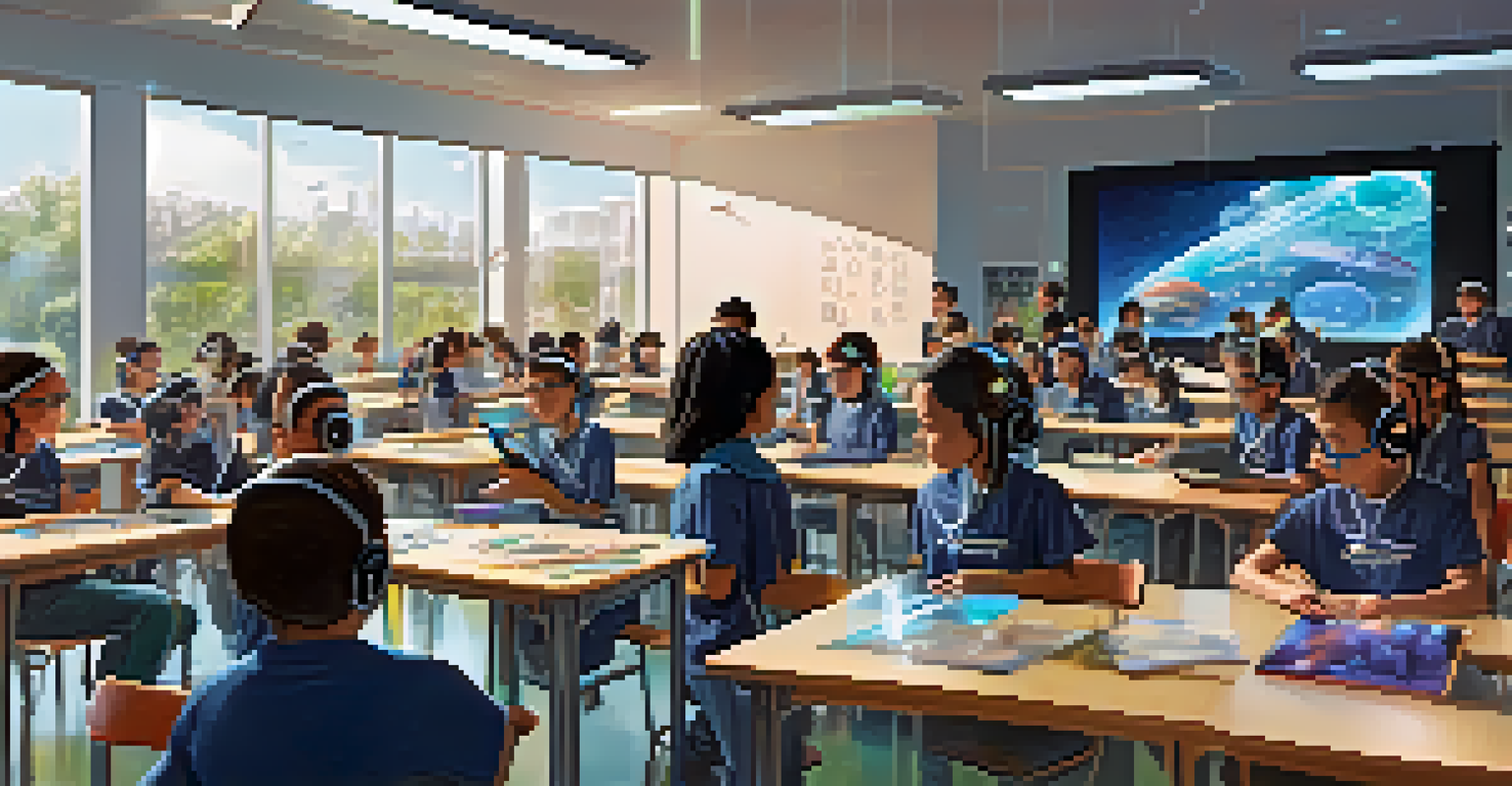How Mobile Technology Supports Skill Development

Understanding Mobile Technology's Role in Learning
Mobile technology has revolutionized the way we learn and develop skills. With smartphones and tablets, educational resources are now at our fingertips, allowing users to access information anytime, anywhere. This flexibility makes learning more accessible, enabling individuals to fit skill development into their busy schedules.
Mobile technology is not just a tool; it is an extension of our minds and our capabilities.
Consider the example of a busy professional who wants to learn a new language. Instead of attending classes at fixed times, they can use mobile apps that offer lessons on the go, turning commutes into productive learning sessions. This adaptability is key to integrating skill development into daily life.
Furthermore, mobile technology supports various learning styles, from visual to auditory. This customization means learners can choose the methods that resonate with them, enhancing engagement and retention of new skills.
The Power of Educational Apps and Platforms
Educational apps have taken the world by storm, providing interactive ways to develop skills. Platforms like Duolingo or Khan Academy offer structured lessons that break down complex topics into manageable chunks. This gamified approach not only makes learning enjoyable but also encourages users to stay committed.

For instance, a student struggling with math can turn to an app that offers exercises tailored to their level. The instant feedback provided by these platforms helps learners identify areas needing improvement, fostering a proactive approach to skill development.
Mobile Tech Makes Learning Accessible
With mobile devices, users can access educational resources anytime, fitting skill development into their busy lives.
Moreover, many apps incorporate social features, allowing users to connect with peers or mentors. This sense of community can be incredibly motivating, as learners can share progress, celebrate achievements, and even collaborate on projects.
Access to Online Courses and Resources
Online courses have democratized education, enabling anyone with a smartphone to learn from top institutions. Platforms like Coursera and Udemy provide a vast array of courses covering diverse subjects, from coding to creative writing. This wealth of information ensures that learners can pursue their interests and develop skills relevant to their careers.
Education is the most powerful weapon which you can use to change the world.
Imagine a graphic designer wanting to enhance their skills in a specific software. Instead of enrolling in a lengthy program, they can take a short online course focusing solely on that tool. This targeted approach allows for efficient learning and immediate application of new skills.
Additionally, many of these courses offer certification upon completion, which can be a valuable addition to a resume. This not only boosts confidence but also enhances professional credibility in a competitive job market.
Mobile Technology and Personalized Learning Experiences
One of the greatest advantages of mobile technology is its ability to create personalized learning experiences. Adaptive learning technologies analyze user behavior and performance to tailor content that meets individual needs. This ensures that learners are not overwhelmed or bored, making the learning process more effective.
For example, a user struggling with a particular concept can receive additional resources or practice questions to reinforce understanding. This level of personalization helps maintain motivation and encourages a deeper engagement with the material.
Apps Enhance Skill Development
Educational apps provide interactive, gamified learning experiences that cater to different learning styles and foster engagement.
As learners progress, mobile platforms can adjust the difficulty of tasks, ensuring they are constantly challenged but not discouraged. This balance is crucial for fostering a growth mindset, where learners see challenges as opportunities for improvement.
Enhancing Collaboration Through Mobile Technology
Mobile technology fosters collaboration, which is essential for skill development. Tools like Slack and Microsoft Teams allow users to connect and collaborate seamlessly, regardless of their physical location. This connectivity encourages knowledge sharing and the exchange of ideas, enriching the learning experience.
Consider a group of developers working on a project from different parts of the world. Using mobile tools, they can brainstorm, share code, and provide feedback in real-time. This collaboration not only enhances individual skills but also promotes teamwork and problem-solving abilities.
Moreover, online forums and social media platforms create spaces for learners to seek advice and share resources. This sense of community can significantly enhance motivation, as learners support each other in their skill development journeys.
Real-Time Feedback and Assessment Opportunities
Another benefit of mobile technology in skill development is the ability to receive real-time feedback. Many educational apps and platforms offer instant assessments that help learners gauge their understanding of a topic. This immediate feedback loop allows for quicker adjustments and reinforces learning.
For instance, a user practicing a new language can receive instant corrections on pronunciation or grammar, helping them improve more rapidly than traditional methods would allow. This timely feedback is vital for building confidence and competence.
Future of Learning is Mobile and AI
The integration of AI and emerging technologies promises to create personalized and immersive learning experiences for skill development.
Additionally, mobile technology often enables self-assessment tools, empowering learners to track their progress over time. By monitoring their development, individuals can celebrate milestones and identify areas for further growth.
The Future of Skill Development with Mobile Technology
The future of skill development is undoubtedly intertwined with mobile technology. As advancements continue, we can expect even more innovative tools and resources that cater to diverse learning needs. The integration of artificial intelligence in educational apps promises to enhance personalization and adaptiveness further.
Imagine a world where learners are guided by AI tutors that understand their unique learning patterns and preferences. This could revolutionize the way skills are developed, making education more efficient and tailored to individual goals.

Moreover, as mobile technology evolves, we may see increased incorporation of virtual and augmented reality, offering immersive learning experiences. This potential for experiential learning can significantly enhance skill acquisition, making it a thrilling time for learners everywhere.